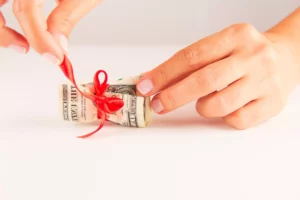I got a dream-come-true present for Christmas, and it turned into a nightmare.
At first glance the present looked not only ideal but perfectly harmless. It was a gift certificate to Barnes & Noble. What could be more thrilling? Fifty whole dollars of not-my-money to spend on any book I wanted, or many books I wanted, or CDs, or even chai latte after chai latte at the Starbucks cafe! Glorious. I could hardly wait to pop into the nearest B&N and settle down to the wonderful hard work of picking out my Christmas present.
That’s when the insanity set in. My consumer brain went to work, and in the process it took over all my other mental functions. I couldn’t get just anything, I started to reason. I had to choose wisely. I had to maximize this fortuitous concentration of fifty dollars in one place. I had to get something worthy of the generosity of my patron, something I could never afford otherwise, something I would never regret buying, something I really really REALLY wanted, something I would turn to again and again in moments of joy and/or anguish, something that would make my life and library complete and could be acquired only under these very specific circumstances. Mission: the ultimate purchase.
Needless to say, having inflicted this level of expectation upon myself and upon my present, I went bonkers in no time at all. On my first trip out to B&N, I found nothing up to standard. I searched from the arts section to the comic book section to the cookbook section and finally to the respectable fiction and literature section. Sure, there was lots of stuff there I wanted. But nothing captivated me. Nothing promised to make my life complete. My inability to locate the one and only Gift Extraordinaire totally stressed me out. I got a headache. And I finished the first round at B&N empty-handed.
During my second compulsory shopping trip, I spent some time looking at music. I wanted everything in sight, but that meant I couldn’t get any books, and that was unacceptable. I ended up wandering around the store for about an hour, taking in nothing but my frantic internal monologue, trying to persuade myself to get the new U2 album on the grounds that I would never ever regret it, even if it left me with only $35 for books. (Goodness, only $35 for books. How would I manage?) At last I forced myself to go through with the purchase. I felt guilty about it for the rest of the day. The fact that I liked the CD was totally irrelevant, of course. The point was that I had, most likely, failed to maximize the benefits of free cash.
The third time at B&N was a mere 48 hours after the second. I returned, brother in tow and under strict instructions not to let me leave until I’d spent every last penny. I had to spend it all; I couldn’t deal with the stress anymore. Every spare minute at home was spent thinking about my leftover thirty-five dollars. I was even dreaming about the magic sum. Should I get the complete cartoons of Charles Addams ($30 plus tax)? Or the collected stories of T. Coraghessan Boyle (but I’d seen the book on sale before for $10, so I could hardly justify paying full price for it now)? The newest installment in the Adrian Mole series (but it’s only out in hardcover, better to wait until it comes out in cheaper paperback)?
I was utterly tortured inside, and not a little irritated at myself for acting so irrationally. I finally settled on two volumes of Shel Silverstein — books I’d always coveted and never had in my clutches — with the understanding that I’d never have gotten around to buying them on my own, so it was right and good to get them now. I felt no guilt when I left the store that time, only relief. (And, thankfully, I had a wonderful time reading some of the poems to one of my little cousins over Christmas.)
Now this might just be a story about how ridiculous I am and the peculiar manifestations of obsessive-compulsive behavior in my personality. But I tend to think (back me up on this one, ok?) that it was a very good object lesson in how Americans think about objects. Or more specifically, how we feel about purchasing objects. Whether we ignore it or not, it’s always staring us in the face. There’s the Wal-mart phenomenon: poorly made but dirt cheap, so what a bargain! If it’s on sale, it must be worth having! There’s the advertising that bombards us on billboards and TV. Heck, we’re willing to pay corporations for the privilege of wearing products that advertise their stuff. There’s the obsession with playing the lottery. Who doesn’t dream of what she could do with ten million dollars (or better yet twenty million)?
These are all cliches by now. We Americans know that we’re obsessed with buying stuff. Consumerism is the basis of our culture. In fact, we talk about our consumerism all the time, acknowledge it, joke about it — and then shrug it off. It’s no big deal, we always say, really. We can handle it. We know that stuff doesn’t save us or make us happy. We just like having it around for fun. Keeps the economy moving. That’s the point of American Beauty (easily one of the most immoral movies I’ve ever made the mistake to see).
As long as we take a charmingly ironic attitude towards our stuff, spill a little beer on the sofa, and pay for our home movies of plastic bags floating in the breeze out of our drug trafficking income, then our hearts and profits are really in the right place. It’s easy enough to laugh it off, and then go on with an utterly unchanged life.
I was awoken from my patriotic indifference to consumerism this past semester because I was blessed with debt. Yes, that says “blessed.” It’s not a typo or even sarcasm. I was blessed with debt. Not severe debt — I admit that deep debt is probably not a blessing for anyone. But enough debt that I had no disposable cash for about five months, a condition I thought I’d left behind about midway through college.
At first I was extremely depressed about it. I had to calculate if I could afford to participate in the late night pizza. I couldn’t medicate myself with new clothes every time I got depressed. I had to join the public library — imagine that! — and borrow books instead of buying them, a practice to which my family has always been deeply averse. (My parents’ house looks a little like a library, as a matter of fact.)
But after a while it began to dawn on me: It’s really not so bad having no disposable cash. I didn’t miss it. Instead of buying clothes, I drew myself silly pictures. Instead of picking out prefabricated presents for my friends at Christmas, I baked them cookies. It was sort of like an epiphany, doubly surprising since I’d never considered myself a frenzied consumer before. I never had my own TV or stereo system or anything like that, and I got my car as a hand-me-down from my parents — tiny and plain white with no A/C or radio, as basic as you can get.
Even so, whenever I did have disposable cash, it evaporated from my fingertips as soon as I touched it. Now, with no money in hand, there was no money to waste. It was a nice feeling — an unusual feeling! — of not being wasteful.
Another thing I discovered was what I really disliked about having no money. I was so busy paying off my debts (with whatever cash came my way) that I couldn’t afford to give anything to my church. That felt unnatural, and selfish, and I didn’t like it. I had nothing to donate to charity. I couldn’t help take the load off others buying the pizza. In fact, it was very hard to be generous at all. Of course there were ways to compensate — the cookies, for example. But there was less opportunity to be spontaneous about it. I spent some time complaining to an Orthodox priest friend of mine about my new-found qualms about cash, and he finally put it to me this way: “Go ahead and earn all you can, because the more you earn, the more you can give away.” That put a whole new spin on it for me. The more I have, the more I can give away.
And then I started to wonder: can I, or should I, give it all away?
Now my immediate reaction to such radical suggestions, whether from myself or from someone else, is to rationalize the situation. Mother Theresa gave it all away; so did St. Francis; that’s probably enough. The world would grind to a halt if we all gave everything away. We’d be beggars, preying on the hard work of someone else, not responsible for ourselves. It’s wrong to make ourselves into charity cases, and as long as we do our part and tithe or whatever, we’re all set.
Yeah, I know that. I’ve always told myself that. I wonder, though, if it isn’t just too easy to sidestep the whole business, arriving at a solution without ever really looking at the problem. We hardly even talk about it in church anymore. We’ll talk about all kinds of other vices, but we turn a blind eye towards greed. Why is it easier to say, “You don’t need to have sex before marriage,” than to say, “You don’t need all that junk you’ve accumulated in your house”? Greed is easier to ignore, and easier to rationalize. Prosperity is part of the life we’re taught to cultivate. Wealth is respectable. Question those assumptions honestly, though, and you’ll discover something I thought didn’t exist anymore: an all-American taboo.
It so happens that the gospel of Luke questions assumptions about wealth pretty incisively. Since I was studying the third gospel last semester alongside my debt, I had no excuse for not confronting my own assumptions head-on. And the answers are indeed radical in the uncomfortable way, not in the fashionable way. The disciples leave everything to follow Jesus. When they go out to preach, they take nothing with them. Jesus says to lend without expecting return and to cancel debts. Zaccheus compensates for his fraud and then some. The rich fool stores up a surplus of useless treasures for himself in his barn on the same night his life is demanded of him; meanwhile the ravens neither sow nor reap yet God feeds them.
Luke’s Beatitudes don’t have Matthew’s spiritual qualifications attached: where Matthew says, “Blessed are the poor in spirit,” Luke says only, “Blessed are the poor.” And worse yet, “Woe to you who are rich, for you have received your consolation.” Is that me? I wonder. The real chill comes from the story of poor Lazarus in the bosom of Abraham and the rich man in Hades whose brothers don’t stand a chance. It all boils down to this: You cannot serve both God and mammon. What’s a middle-class American to do?
I’d like to say that as long as I’m generous with my stuff I can manage all right. But I’m not sure that I really can manage all right. Just after New Year’s I got a notice that I’d been granted another scholarship that would put me entirely out of debt and even give me some surplus to pay for books. What a windfall! I was grateful beyond belief to have the burden removed, and unexpectedly at that. But my gut reaction betrayed me. My very first thought was this: I should go shopping! I need new clothes! I must have more books! I ought to get a pair of boots! My money is my own again and I can spend it to my heart’s content! Should, need, must, ought, mine, mine, mine.
The problem is that my money is no more my own than my life, but as long as I have it, I always forget that. Jesus says that whoever seeks to save her life will lose it and whoever loses her life for his sake will find it. Does the same thing apply to wealth? If I lose my wealth for his sake will I find it again in the imperishable treasure? I don’t know yet. I’m still too anxious about the fallout to make any radical decisions about it.
But the mustard seed has been planted, and I suspect that, when it grows to its full size, there won’t be room for much other stuff in my life.
Copyright 2001 Sarah E. Hinlicky. All rights reserved.










